Suchergebnisse
Energy Technology Perspectives 2016 - Towards Sustainable Urban Energy Systems

Die jährlich erscheinende IEA-Publikation Energy Technology Perspectives 2016 (ETP 2016) entwickelt Visionen für zukünftige und nachhaltige Energiesysteme. Der Technologiebericht 2016 der IEA bescheinigt Städten und dem Verkehrssektor eine Schlüsselrolle zur Erreichung der Klimaziele.
Herausgeber: International Energy Agency (IEA), ©OECD/IEA 2016
Deutsch, 20 Seiten
Downloads zur Publikation
Distributed power generation and intelligent networks
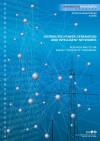
Research inputs for energy systems of tomorrow
5/2006
Herausgeber: BMVIT
Englisch, 6 Seiten
Downloads zur Publikation
Berichte aus Energie- und Umweltforschung 21/2002 Textile Fasermodifikation: umweltschonenden Verarbeitungsprozesses von Viskosefasern

Basierend auf den Ergebnissen dieser Untersuchung ist zu erwarten, dass mit einer neuen Fasergeneration, eine Reduktion des Einsatzes von Energie, Wasser und Chemikalien zwischen 40 und 100% zu erreichen ist.
Schaffung von rechtlichen Potenzialen für Urban Mining im Abfallrecht
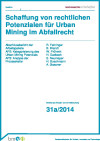
Schriftenreihe
31 /2014
R. Fehringer, B. Brandt, W. Frühwirth, et al.
Herausgeber: BMVIT
Deutsch, 274 Seiten
Downloads zur Publikation
FARB & STOFF - Sustainable Development durch neue Kooperationen und Prozesse
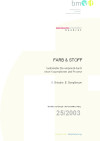
Schriftenreihe
25/2003
S.Geissler, E.Ganglberger
Deutsch, 173 Seiten
Downloads zur Publikation
Subprojekt 6a: Energieeffiziente Wohnquartiere durch Community Organizing
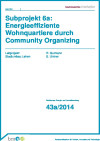
Leitprojekt: Stadtumbau Lehen
Schriftenreihe
43a/2014
R. Gutmann S. Untner
Herausgeber: BMVIT
Deutsch, 43 Seiten
Downloads zur Publikation
Cepheus Cost Efficient Passive Houses As European Standards
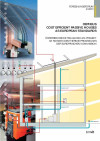
Österreichische Teilnahme am Projekt im Rahmen des THERMIE-Programms der Europäischen Kommission
Forschungsforum
2/2001
Herausgeber: BMVIT
Deutsch, 6 Seiten
Downloads zur Publikation
Life Cycle Inventories and Life Cycle Assessments of Photovoltaic Systems
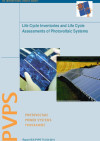
IEA-PVPS Task 12, April 2015
Herausgeber: IEA Photovoltaic Power Systems Programme
Englisch, 86 Seiten
Downloads zur Publikation
Multifunktionale Energiezentralen am Beispiel Biogas
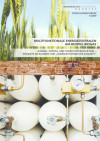
Wärme-, Strom- und Treibstoffproduktion - Projekte im Rahmen von "Energiesysteme der Zukunft"
1/2009
Herausgeber: BMVIT
Deutsch, 6 Seiten
Downloads zur Publikation
Abschluss der Bauarbeiten von GREENsChOOLENERGY
28. Juni 2023
Lastenstraße 1, Klagenfurt am Wörthersee, AT
Im Rahmen der abgeschlossenen Bauarbeiten findet die Abschlussveranstaltung des Förderprojekts GREENsChOOLENERGY an der Höheren Technischen Lehranstalt HTL1 Lastenstraße statt. Im Zuge der Veranstaltung findet ein kurzer Vortrag zum Förderprojekt GREENsChOOLENERGY statt und anschließend wird ein gemeinsamer Rundgang zu den abgeschlossenen Baumaßnahmen an der Schule gemacht.
IEA HPT Annex 56: myiDM +energy - Datenblatt zu IoT Projekten und Produkten (2023)

Das Datenblatt gibt einen kompakten Überblick über das Wärmepumpenprodukt von iDM (Optimierung des Stromverbrauchs anhand von stündlichen Strompreisen, Steigerung des PV-Eigenverbrauchs).
Englisch, 2 Seiten
Downloads zur Publikation
IEA HPT Annex 56: Digitalization and IoT for Heat Pumps Task 4: Business models (2023)

Der Bericht beschreibt verschiedene Geschäftsmodelle für IoT-Wärmepumpen und liefert eine detaillierte SWOT-Analyse (Stärken, Schwächen, Chancen und Risiken) für ausgewählte Anwendungsfälle.
Herausgeber: IEA Heat Pump Centre
Englisch, 59 Seiten
Downloads zur Publikation
IEA-Task 42 Studie: Bio-based chemicals - Value added products from biorefineries
Diese Studie befasst sich mit den wichtigsten bio-basierten Chemikalien, die in Bioraffinerien hergestellt und für eine Vielzahl von Anwendungen, wie beispielsweise die Herstellung von Materialien und erneuerbaren Energieträgern, eingesetzt werden können.
Mitteilungsblatt zur Nutzung von Biomasse "Biobased Future" Nr. 1/2014 ist online
Das Mitteilungsblatt "Biobased Future" ist der Nachfolger des Mitteilungsblattes "Nachwachsende Rohstoffe" und erscheint zweimal jährlich. Inhaltlich steht die Verbreitung von aktuellen Informationen und Entwicklungen zur stofflichen und energetischen Nutzung von nachwachsenden Rohstoffen im Vordergrund.
Zusammenfassung der 8. Internationalen Anwenderkonferenz für Biomassevergasung
Zusammenfassung und Ausblick der Konferenz am 2. Dezember 2015 in Innsbruck sind online.
Der aktuelle IEA Bioenergie Task 39 Newsletter ist ab sofort online verfügbar
Der neue Task 39 Newsletter bietet einen guten Überblick über die laufenden Aktivitäten und geplanten Projekte innerhalb der Arbeitsgruppe "Biofuels", sowie über kommende Veranstaltungen im gesamten Bioenergie-Themenbereich der IEA.
Demonstrationsprojekt "Kaiserstraße 7" erhält den Wiener Stadterneuerungspreis
Der Wiener Stadterneuerungspreis der Landesinnung Bau wird an vorbildliche Bauprojekte vergeben, die historische Bausubstanz erhalten und die Wohnverhältnisse verbessern. Der Preis, welcher heuer bereits zum 29. Mal vergeben wurde ging an das "Haus der Zukunft"-Demonstrationsgebäude "Kaiserstraße 7, Innovative Sanierung im Denkmalschutz".
IEA-Länderbericht 2014: Gutes Zeugnis für Österreichische Energieforschung
Im Rahmen des IEA-Länderberichts werden die energiepolitischen Ziele und Maßnahmen der IEA-Länder sowie deren Forschungsausgaben evaluiert.
Workshop: Zukunft der industriellen Nutzung nachwachsender Rohstoffe
6. Nov 2003 -
7. Nov 2003
Schloss SeggauLeibnitz, AT
Identifikation drängender Zukunftsfragen um Bereitstellung und Nutzung nachwachsender Rohstoffe
Symposium: Innovatives Gebäudedesign in multifunktionalen Gebäuden
12. Juni 2013
Landesberufsschule Amstetten, Leopold-Maderthaner-Platz 2
Amstetten, AT
AIDA bietet in Zusammenarbeit mit dem BMVIT eine hochkarätige Exkursion mit Besichtigung eines wegweisenden Schulbaus sowie Fachvorträgen für Planer und Architekten sowie Lokalpolitik und öffentliche Verwaltung.
